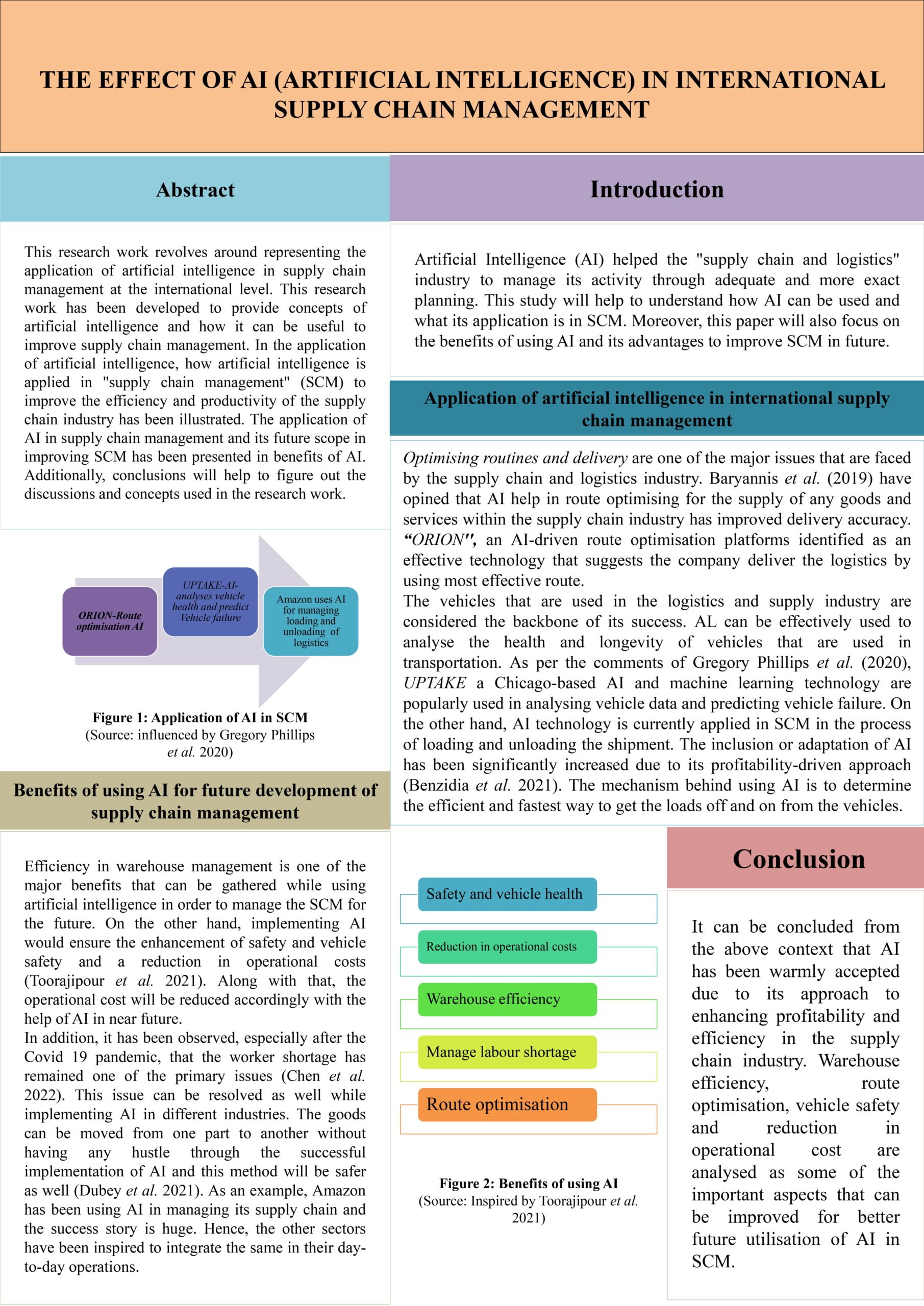Table of Contents
Abstract:
The research work revolves around representing the application of artificial intelligence in supply chain management at the international level. This research work has been developed to provide concepts of artificial intelligence and how it can be useful to improve supply chain management. In the application of artificial intelligence, how artificial intelligence is applied in “supply chain management” (SCM) to improve the efficiency and productivity of the supply chain industry has been illustrated. The application of AI in supply chain management and its future scope in improving SCM has been presented in benefits of AI. Additionally, conclusions will help to figure out the discussions and concepts used in the research work.
Also Read Poster Making Assignment Help | Business Assignment Help for a Fast Food Restaurant
Poster Making Assignment –
Topic – THE EFFECT OF AI (ARTIFICIAL INTELLIGENCE) IN INTERNATIONAL SUPPLY CHAIN MANAGEMENT

Note: Do you need Poster Assignment Help? Contact us now!
Introduction:
Artificial Intelligence (AI) helped the “supply chain and logistics” industry to manage its activity through adequate and more exact planning. This study will help to understand how AI can be used and what its application is in SCM. Moreover, this paper will also focus on the benefits of using AI and its advantages to improve SCM in future.
Benefits of using AI for future development of supply chain management:
Efficiency in warehouse management is one of the major benefits that can be gathered while using artificial intelligence in order to manage the SCM for the future. On the other hand, implementing AI would ensure the enhancement of safety and vehicle safety and a reduction in operational costs (Toorajipour et al. 2021). Along with that, the operational cost will be reduced accordingly with the help of AI in near future. In addition, it has been observed, especially after the Covid 19 pandemic, that the worker shortage has remained one of the primary issues (Chen et al. 2022). This issue can be resolved as well while implementing AI in different industries. The goods can be moved from one part to another without having any hustle through the successful implementation of AI and this method will be safer as well (Dubey et al. 2021). As an example, Amazon has been using AI in managing its supply chain and the success story is huge. Hence, the other sectors have been inspired to integrate the same in their day-to-day operations.
Application of artificial intelligence in international supply chain management:
Optimising routines and delivery are one of the major issues that are faced by the supply chain and logistics industry. Baryannis et al. (2019) have opined that AI help in route optimising for the supply of any goods and services within the supply chain industry has improved delivery accuracy. “ORION”, an AI-driven route optimisation platforms identified as an effective technology that suggests the company deliver the logistics by using most effective route. The vehicles that are used in the logistics and supply industry are considered the backbone of its success. AL can be effectively used to analyse the health and longevity of vehicles that are used in transportation. As per the comments of Gregory Phillips et al. (2020), UPTAKE a Chicago-based AI and machine learning technology are popularly used in analysing vehicle data and predicting vehicle failure. On the other hand, AI technology is currently applied in SCM in the process of loading and unloading the shipment. The inclusion or adaptation of AI has been significantly increased due to its profitability-driven approach (Benzidia et al. 2021). The mechanism behind using AI is to determine the efficient and fastest way to get the loads off and on from the vehicles.
Conclusion:
It can be concluded from the above context that AI has been warmly accepted due to its approach to enhancing profitability and efficiency in the supply chain industry. Warehouse efficiency, route optimisation, vehicle safety and reduction in operational cost are analysed as some of the important aspects that can be improved for better future utilisation of AI in SCM.
References:
- Baryannis, G., Dani, S., Validi, S. and Antoniou, G., (2019). Decision support systems and
artificial intelligence in supply chain risk management. In Revisiting supply chain risk (pp. 53-
71). Springer, Cham. - Benzidia, S., Makaoui, N. and Bentahar, O., (2021). The impact of big data analytics and
artificial intelligence on green supply chain process integration and hospital environmental
performance. Technological Forecasting and Social Change, 165, p.120557. - Chen, Y., Biswas, M.I. and Talukder, M.S., (2022). The role of artificial intelligence in effective
business operations during COVID-19. International Journal of Emerging Markets, (ahead-of-
print). - Dubey, R., Bryde, D.J., Foropon, C., Tiwari, M., Dwivedi, Y. and Schiffling, S., (2021). An
investigation of information alignment and collaboration as complements to supply chain agility
in humanitarian supply chain. International Journal of Production Research, 59(5), pp.1586-
1605. - Gregory Phillips, I.I., Raman, A.B., Felt, D., McCuskey, D.J., Hayford, C.S., Pickett, J.,
Lindeman, P.T. and Mustanski, B., 2020. PrEP4Love: the role of messaging and prevention
advocacy in PrEP attitudes, perceptions, and uptake among YMSM and transgender women.
Journal of acquired immune deficiency syndromes (1999), 83(5), p.450. - Toorajipour, R., Sohrabpour, V., Nazarpour, A., Oghazi, P. and Fischl, M., (2021). Artificial
intelligence in supply chain management: A systematic literature review. Journal of Business
Research, 122, pp.502-517.

